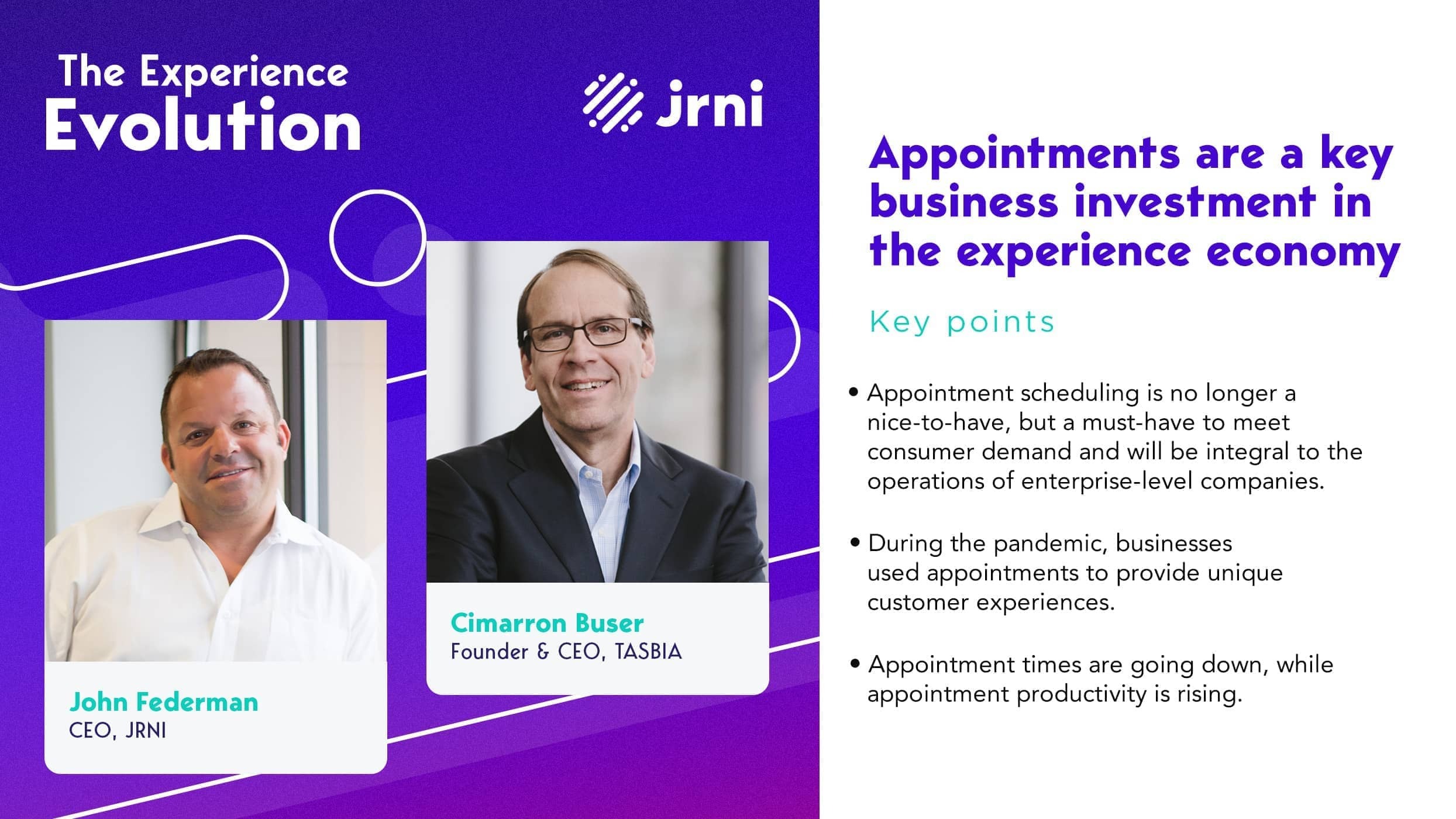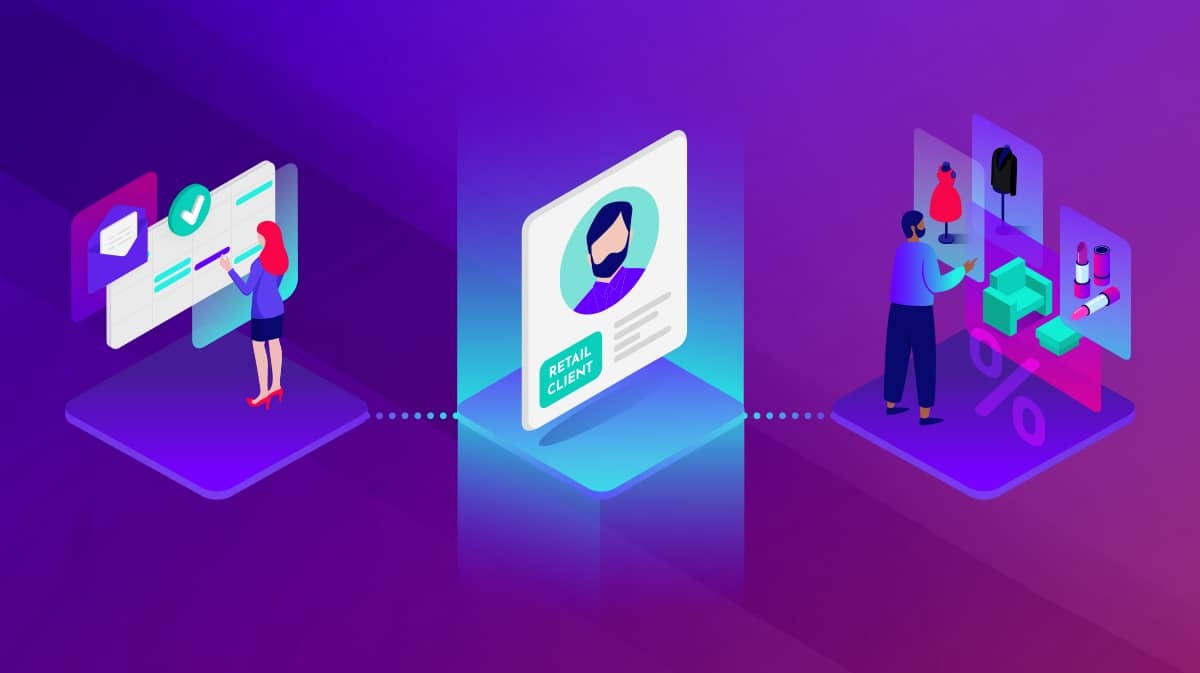In JRNI’s second podcast episode, CEO, John Federman, and Cimarron Buser, Founder & CEO of TASBIA (The Appointment Scheduling & Booking Industry Association), share insights on the importance of appointments in providing great experiences and meeting demand, and becoming a core part of many organizations’ strategies. They’ll discuss:
How appointment scheduling is no longer a nice-to-have, but a must-have, to meet consumer expectations
How appointments have become integral to the operations of enterprise-level companies
How the pandemic accelerated the want and need for appointments, and how many businesses utilized them to continue providing personalized, human-to-human experiences
Appointment scheduling trends, including how appointment times are going down, while productivity is going up

Businesses already recognized the importance of appointments as an experience driver for customers and prospects long before the pandemic.
However, once the pandemic hit, the need and desire for appointments accelerated. Retailers, financial institutions, and many other businesses are driving significant value and ROI from providing one-to-one appointments for consumers.
In working for an appointment and scheduling provider, Buser saw the need to educate companies on the value appointments could bring to their businesses, which led him to start TASBIA (The Appointment Scheduling & Booking Industry Association).
“I started the association last year with a two-fold mission,” Buser said. “First, to help appointment scheduling, booking, queuing, and other similar technology providers that have common challenges, including trying to get access to industry information and trying to understand customer behavior. And, secondly, to promote the use of appointment scheduling to anyone interested. This is primarily for business customers.”
Federman said that one of the trends he saw during the pandemic was the role of appointments transforming from a nice-to-have to a must-have for organizations in many industries. With this, appointments have become integral to the operations of many enterprise-level businesses.
“What we're starting to see is, rather than appointments being an add-on, is the transition to being an integration into the full business processes. In other words, it's not a standalone widget. It's now integrated into the CRM system, it's integrated into the marketing infrastructure, it's integrated into all analytics, and those dashboards which drive performance. What we've done ourselves at JRNI, and in the industry, is recognize that this transition means that all the requirements that every senior-level enterprise buyer puts on other software purchases is now firmly a part of the requirements in the appointment industry as well.”
John Federman, CEO
The differentiator and transition to becoming a key part of enterprise-level businesses means taking things into consideration such as information security, multiple languages, multiple time zones, and the multiple disciplines that enterprises require. As large companies have entered the appointment category recently, many aren’t built to take on enterprise needs.
“There's a little bit of a no man's land, you've got your big enterprise application software providers who are adding on appointments as a feature. And the best news for the category, frankly, is that they’ve come up short. And the reason I say that is, it underscores just how differentiated and how complicated the infrastructure of creating a scalable enterprise appointment solution really is,” Federman said.
Appointment scheduling software has become a must-have
The usage of appointments offered by companies also skyrocketed during the pandemic, and continues to trend upwards as things start to return to “normal”.
“We’ve seen one top-10 U.S. bank increase their appointment volume by about 2,200% from 2019 to 2020,” Federman said.
As the need for appointments increases, so does efficiency. Businesses now strive to make the appointment experience as value-oriented for both sides as possible.
“Companies create a customer journey on the front end that asks a lot of questions, so that, when that appointment happens, the associate has all the information in hand,” Federman said. “That appointment is productive, it’s personal, it’s relevant, and it delivers an experience that keeps people coming back.”
In addition, Buser adds that the convenience and availability of appointments, including virtual appointments, has accelerated the need not only for appointment scheduling, but the need to provide various appointment modes to meet consumer expectations.
“I think a big trend is that some types of meetings that people thought historically just had to happen in person, all of sudden, they realized, no, actually we can do it differently,” Buser said. “Once people get that experience of doing it differently and better, and saving all this time, they don't want to go back.”
Federman said appointments have become so critical to provide exceptional customer experiences that it becomes a disadvantage to not offer them.
“The competitive disadvantage is not offering appointments, they continue to provide a considerable value to consumers,” Federman said. “So if you think about it, it circles back to the importance of providing true omnichannel, personalized, frictionless experiences, and you don't get that personalization and human connection by just browsing products and services online, or frankly, in person. You get that when you are paired with an expert, to help you shop for that new wardrobe or plan your next financial move.”
Subscribe to The Experience Evolution today!
Want to be updated when our next podcast episode is available? Then be sure to subscribe on Apple or Spotify! You can download the episodes and listen at your convenience. Additionally, you can find all future podcast episodes on our Resources page. If you are looking to provide better customer experiences through appointment scheduling, then sign up to speak to one of our experts!



